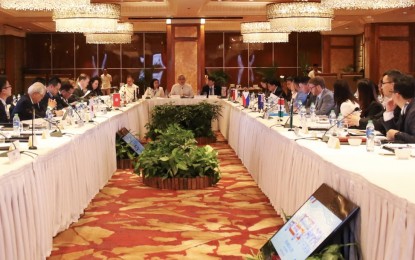
DATA PRIVACY. National Privacy Commission Chair Edmund Enriquez Liboro presides the 52nd Asia Pacific Privacy Authorities forum on Monday (Dec. 2, 2019) at the Shangri-La Mactan Resort in Lapu-Lapu City, Cebu. Liboro assured global trade players that the Philippines is a safe destination for data. (PNA photo by Sheriza Mae Uy)
LAPU-LAPU CITY, Cebu -- The Philippine delegates to the 52nd Asia Pacific Privacy Authorities (APPA) forum on Monday assured global trade players of data privacy in the country.
Raymund Enriquez Liboro, privacy commissioner of the Philippines, said “business can be conducted here in a safe manner” because of regulations involving data privacy.
In his opening remarks, Liboro highlighted the need to ensure that privacy regulations across the Asia-Pacific region are responsive to the need to safeguard individual protection of personal data and facilitate the safe flow of information.
“Value in today’s data-driven world is created by building bridges and not walls. And that’s what we intend to accomplish today at the APPA Forum. To build bridges towards a future that is safe and progressive, which our children could immensely benefit from,” he said in his message delivered before the forum participants.
The Philippines is the host for this year’s APPA forum held at the Shangri-La Mactan Resort in this historic island in Cebu with the National Privacy Commission (NPC) chaired by Liboro taking the lead.
Privacy commissioners from the region and guests of the Asean representatives converged here for the main event from December 2-3.
“The Philippines is a destination for data and your business can be conducted here in a safe manner by way of protecting personal data not only for citizens (of this country) but also citizens from other jurisdictions,” he said during the press briefing on the sidelines.
British Columbia Privacy Commissioner Michael McEvoy said “data of the citizens can only be protected by way of coordination” among states, stressing that “data can cross borders in just milliseconds.”
McEvoy underscored the collaboration between the government and the private sector in laying down policies concerning the privacy of data among countries.
During the press conference, he pushed for “meaningful sanctions” against violators who would be found guilty of breach of privacy of individuals.
He said that “defragmentation of laws” relating to data privacy does not only takes place in a more developed economy like Canada but also in emerging economies in Asia.
Stephen Kai-Yi Wong, Hong Kong’s privacy commissioner, said that “digital balance all over the world” can be assured when the same privacy policies are shared among countries with diverse privacy issues.
“The world is driving towards a common approach in relation to law enforcement in relation to collaboration in investigation, in terms of exchange of information, of intelligence about data breach especially of the tech giants and also violence,” Wong said.
He said that he agreed with APPA’s advocacy in “assuming harmonization of laws and practices.
McEvoy commended the efforts of the NPC in facing the challenges linked with international data transfer issues and cross-border enforcement of privacy laws across the Asia Pacific.
“I was very impressed with the efforts of the NPC. Despite being one of the youngest jurisdiction, they have done a great deal more than any older economies,” he said.
Three side events are also scheduled during the APPA forum which is open to all data protection officers (DPOs) and the general public. They are the NPC’s DPO ACE (Accountability, Compliance, and Ethics) certification program, the Global Privacy Forum, and the PSST! (Privacy, Security, Safety, and Trust) symposium for students and educators.
Around 800 data protection officers (DPOs) in Visayas and Mindanao will seek ACE (accountability, compliance, and ethics) certification on Tuesday (Dec. 3) at the Waterfront Hotel in this city. (PNA)
